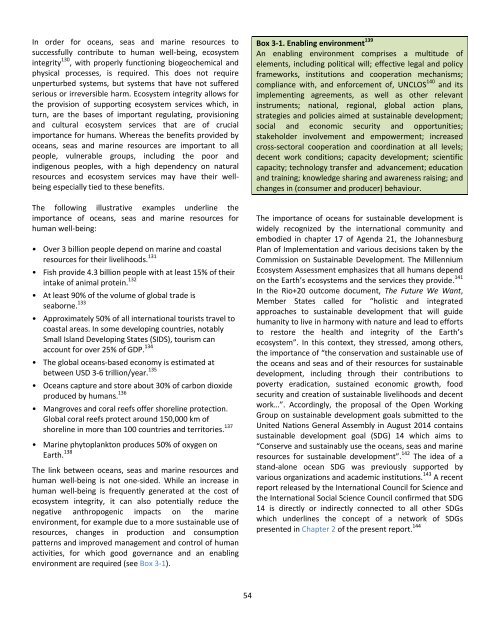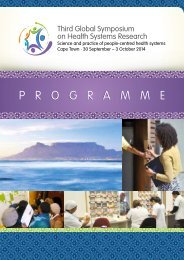In order for oceans, seas and marine resources tosuccessfully contribute to human well-being, ecosystemintegrity 130 , with properly functioning biogeochemical andphysical processes, is required. This does not requireunperturbed systems, but systems that have not sufferedserious or irreversible harm. Ecosystem integrity allows forthe provision of supporting ecosystem services which, inturn, are the bases of important regulating, provisioningand cultural ecosystem services that are of crucialimportance for humans. Whereas the benefits provided byoceans, seas and marine resources are important to allpeople, vulnerable groups, including the poor andindigenous peoples, with a high dependency on naturalresources and ecosystem services may have their wellbeingespecially tied to these benefits.The following illustrative examples underline theimportance of oceans, seas and marine resources forhuman well-being:• Over 3 billion people depend on marine and coastalresources for their livelihoods. 131• Fish provide 4.3 billion people with at least 15% of theirintake of animal protein. 132• At least 90% of the volume of global trade isseaborne. 133• Approximately 50% of all international tourists travel tocoastal areas. In some developing countries, notablySmall Island Developing States (SIDS), tourism canaccount for over 25% of GDP. 134• The global oceans-based economy is estimated atbetween USD 3-6 trillion/year. 135• Oceans capture and store about 30% of carbon dioxideproduced by humans. 136• Mangroves and coral reefs offer shoreline protection.Global coral reefs protect around 150,000 km ofshoreline in more than 100 countries and territories. 137• Marine phytoplankton produces 50% of oxygen onEarth. 138The link between oceans, seas and marine resources andhuman well-being is not one-sided. While an increase inhuman well-being is frequently generated at the cost ofecosystem integrity, it can also potentially reduce thenegative anthropogenic impacts on the marineenvironment, for example due to a more sustainable use ofresources, changes in production and consumptionpatterns and improved management and control of humanactivities, for which good governance and an enablingenvironment are required (see Box 3-1).Box 3-1. Enabling environment 139An enabling environment comprises a multitude ofelements, including political will; effective legal and policyframeworks, institutions and cooperation mechanisms;compliance with, and enforcement of, UNCLOS 140 and itsimplementing agreements, as well as other relevantinstruments; national, regional, global action plans,strategies and policies aimed at sustainable development;social and economic security and opportunities;stakeholder involvement and empowerment; increasedcross-sectoral cooperation and coordination at all levels;decent work conditions; capacity development; scientificcapacity; technology transfer and advancement; educationand training; knowledge sharing and awareness raising; andchanges in (consumer and producer) behaviour.The importance of oceans for sustainable development iswidely recognized by the international community andembodied in chapter 17 of Agenda 21, the JohannesburgPlan of Implementation and various decisions taken by theCommission on Sustainable Development. The MillenniumEcosystem Assessment emphasizes that all humans dependon the Earth’s ecosystems and the services they provide. 141In the Rio+20 outcome document, The Future We Want,Member States called for “holistic and integratedapproaches to sustainable development that will guidehumanity to live in harmony with nature and lead to effortsto restore the health and integrity of the Earth’secosystem”. In this context, they stressed, among others,the importance of “the conservation and sustainable use ofthe oceans and seas and of their resources for sustainabledevelopment, including through their contributions topoverty eradication, sustained economic growth, foodsecurity and creation of sustainable livelihoods and decentwork…”. Accordingly, the proposal of the Open WorkingGroup on sustainable development goals submitted to theUnited Nations General Assembly in August 2014 containssustainable development goal (SDG) 14 which aims to“Conserve and sustainably use the oceans, seas and marineresources for sustainable development”. 142 The idea of astand-alone ocean SDG was previously supported byvarious organizations and academic institutions. 143 A recentreport released by the International Council for Science andthe International Social Science Council confirmed that SDG14 is directly or indirectly connected to all other SDGswhich underlines the concept of a network of SDGspresented in Chapter 2 of the present report. 14454
Box 3-2. First World Ocean Assessment3.1. Interlinked issues: oceans, seas, marine resourcesjurisdiction, namely in the high seas 148 and the Area 149 . TheAd Hoc Open-ended Informal Working Group to studyTable 3-1 summarizes some important inter-linkagesissues relating to the conservation and sustainable use ofamong nexus areas and lists illustrative scientific reports, asmarine biological diversity beyond areas of nationalwell as areas for further research suggested by contributingjurisdiction has been meeting regularly since 2006. The lastexperts. Contributing experts estimate the scientificmeeting of the Working Group, held in January 2015,coverage of oceans, seas and marine resources as beingstressed the need for a comprehensive global regime torather developed, notwithstanding the fact that large areasbetter address the conservation and sustainable use ofof the oceans are unexplored and unknown forms ofmarine biodiversity beyond areas of national jurisdictionmarine life and their habitat remain to be discovered. Theand resulted in the recommendation to develop anscientific coverage of the impact of ecosystem integrity oninternational legally-binding instrument under the Unitedhuman well-being is seen as being rather developed withNations Convention on the Law of the Sea. 150 regard to the creation of jobs and sustainable livelihoods,but weak with regard to the evaluation of benefits derivedThe Regular Process for Global Reporting and Assessmentof the State of the Marine Environment, including SocioeconomicAspects was established by the United NationsGeneral Assembly to strengthen the regular scientificassessment of the state of the marine environment in orderto enhance the scientific basis for policymaking. The startupphase to the Regular Process, called the “assessment ofand human well-beingRegarding the overall scientific coverage of the nexus andits threats (Section 3.2), contributing experts note that thenumber and quality of assessments are very variable interms of the geographic range or areas they cover. Someresearch areas and regions are more poorly covered thanothers due to a lack of or uneven distribution of financialassessments”, was concluded in 2009. 145 A census of support, technological and human resources and capacitiesexisting ocean assessments was conducted and and/or logistical limitations due to habitat inaccessibilityconsolidated in the Gramed database. 146 The output of thefirst cycle of the Regular Process, the First Global IntegratedMarine Assessment (“World Ocean Assessment”) 147 , isunder preparation and will be considered by the Ad HocWorking Group of the Whole in September 2015 and asummary thereof will be considered by the United NationsGeneral Assembly at its seventieth session. It is expected toprovide an overall assessment of the scale of human impacton the oceans and the overall value of the oceans tohumans; the main threats to the marine environment andhuman economic and social well-being; the needs forcapacity-building and effective approaches to meeting suchneeds; and the most serious gaps in knowledge andpossible ways of filling them.Apart from supporting the World Ocean Assessment, oceanscientists are informing other intergovernmental processesand meetings, including the United Nations Open-endedInformal Consultative Process on Oceans and the Law ofthe Sea and the Ad Hoc Open-ended Informal WorkingGroup to study issues relating to the conservation andsustainable use of marine biological diversity beyond areasof national jurisdiction (see Box 3-3).(remote areas or deep sea). Research tends to be veryresults-driven, so that areas where clearly definable resultscan be demonstrated in a short amount of time tend to bemore pursued and financed. There is a need for moreintegrated study of the oceans by teams of natural andsocial scientist to propose and assess different sustainabledevelopment scenarios. However, natural and socialscientists seldom work together due to their use ofdifferent research methods, different geographical scales ofresearch and the fact that funding is often only targeted atone type of research. Some areas are at the forefront ofnew science and need more time for research to mature.Another problem identified by experts is the lack of freeand openly available data. Quite few data remainunpublished or are not available through open accessdatabases. While the experts’ priorities for future researchvary according to their expertise, important research areasmentioned by several experts were: (1) understanding thedirect, cumulative and interacting effects of anthropogenicthreats on biodiversity, ecosystem functioning and stabilityand human well-being; (2) qualitative and quantitativeevaluation of ecosystem services and their connection tohuman well-being; (3) importance of biodiversity (at allBox 3-3. Ad Hoc Open-ended Informal Working GroupIn recent years, the international community has becomeincreasingly aware of the range of services provided bymarine ecosystems and of the rich biodiversity of pelagicand benthic ecosystems beyond the limits of nationallevels of food web) for ecosystem functioning and stability;(4) impact of different policy and management options onsustainable ocean management; (5) adaptive capacity ofocean-dependent communities and livelihoods vis-à-visthreats.from marine resources and ecosystem services. Thisillustrates a need for more systematic global and regional55
- Page 1 and 2:
GLOBAL SUSTAINABLEDEVELOPMENT REPOR
- Page 3:
ForewordIn September 2015, world le
- Page 6 and 7:
3.1. Interlinked issues: oceans, se
- Page 8 and 9: 7.2.1. Open call for inputs to the
- Page 10 and 11: Box 5-10. Operationalizing inclusiv
- Page 12 and 13: Figure 8-8. Location of ambulance u
- Page 14 and 15: Hentinnen (DFID); Annabelle Moatty
- Page 16 and 17: Friendship University of Russia, Ru
- Page 18 and 19: List of Abbreviations and AcronymsA
- Page 20 and 21: IRENAIRIISEALISSCITCITU-TIUCNIUUIWM
- Page 22 and 23: USAIDVPoAVSSWBGUWCDRRWEFWFPWMOWTOWW
- Page 24 and 25: Figure ES-0-1. Possible roles for t
- Page 26 and 27: Figure ES-0-2. Links among SDGs thr
- Page 28 and 29: increase either the availability or
- Page 30 and 31: Chapter 1.The Science Policy Interf
- Page 32 and 33: Complex relationship between scienc
- Page 34 and 35: Communication between scientists an
- Page 36 and 37: 1.2.1. Highlighting trends and prov
- Page 38 and 39: International, Marine Stewardship C
- Page 40 and 41: limited. There is a relative dearth
- Page 42 and 43: educe the time lag between science
- Page 44 and 45: Chapter 2. Integrated Perspectives
- Page 46 and 47: 2.1.4. Recommendations by the Inter
- Page 48 and 49: ultimate idea is systems design - t
- Page 50 and 51: 2.2. Integrated SDG perspectives in
- Page 52 and 53: Hunger andagriculturePovertyWorld B
- Page 54 and 55: IIASA-GEAPBLSEIOECDRITE-ALPSFEEMGSG
- Page 56 and 57: Table 2-4. Number of models capturi
- Page 60 and 61: fully integrated scientific assessm
- Page 62 and 63: While some efforts are undertaken t
- Page 64 and 65: Table 3-3. Impact of important clas
- Page 66 and 67: Marine pollution from marine and la
- Page 68 and 69: While the scientific coverage of th
- Page 70 and 71: managementinitiative in BancoChinch
- Page 72 and 73: equired, with natural and social sc
- Page 74 and 75: Table 4-1. SDGs and DRR linkagesSDG
- Page 76 and 77: poverty forces low-income household
- Page 78 and 79: Figure 4-1. Economic losses relativ
- Page 80 and 81: OECD countries and, if they are ava
- Page 82 and 83: 4.3.4. Baseline setting and assessi
- Page 84: Using assessed levels of risk as ba
- Page 87 and 88: Table 4-3. Disaster management cycl
- Page 89 and 90: New sensor data also includes unman
- Page 91 and 92: Chapter 5. Economic Growth, Inclusi
- Page 93 and 94: Table 5-1. Industrial policy waves
- Page 95 and 96: Figure 5-3. Number of Y02 patents p
- Page 97 and 98: increasingly production specific an
- Page 99 and 100: 5.3. Industrialisation and social s
- Page 101 and 102: education will either make it hard
- Page 103 and 104: Table 5-3. UNEP’s five key types
- Page 105 and 106: 5.6. Concluding remarksThe precedin
- Page 107 and 108: occurs despite the lower share of e
- Page 109 and 110:
LLDCs face several development chal
- Page 111 and 112:
technology-innovation (STI) policie
- Page 113 and 114:
6.2.3. Relevant publications for LD
- Page 115 and 116:
- A patent bank would help LDCs sec
- Page 117 and 118:
In comparison to the Almaty Program
- Page 119 and 120:
Box 6-6. ASYCUDA and Landlocked Cou
- Page 121 and 122:
6.4.5. The landscape of SIDS relate
- Page 123 and 124:
Table 6-2. Example of science-polic
- Page 125 and 126:
Figure 6-9. Data availability for i
- Page 127 and 128:
Review Focusing on the Least Develo
- Page 129 and 130:
Table 6-5. Coverage of SDGs in publ
- Page 131 and 132:
- SYLWESTER, Kevin. Foreign direct
- Page 133 and 134:
SIDS:- UNCTAD. Improving transit tr
- Page 135 and 136:
Chapter 7.Science Issues for the At
- Page 137 and 138:
7.2.1. Open call for inputs to the
- Page 139 and 140:
implementation (SDG17), peaceful an
- Page 141 and 142:
percentage of women holding a leade
- Page 143 and 144:
environment, in order to make stron
- Page 145 and 146:
technology transfer. Respect for ea
- Page 147 and 148:
Figure 7-5. Concentrations of plast
- Page 149 and 150:
SDGs What is measured? Data source
- Page 151 and 152:
UN SystementityECLAC Drafted and re
- Page 153 and 154:
Figure 7-6 shows very wide ranges f
- Page 155 and 156:
Table 7-8. Factors that promoted or
- Page 157 and 158:
Chapter 8. New Data Approaches for
- Page 159 and 160:
These novel Internet- and SMS-based
- Page 161 and 162:
GabonNamibiaNigerSenegalRep CongoC
- Page 163 and 164:
Figure 8-5. Poverty map for Guinea,
- Page 165 and 166:
Figure 8-9. Map of internet connect
- Page 167 and 168:
Box 8-11. A geographical approach t
- Page 169 and 170:
There are many well established met
- Page 171 and 172:
epidemics. Some African countries a
- Page 173 and 174:
Figure 8-13. Data innovations cover
- Page 175 and 176:
issues” in respective areas of ex
- Page 177 and 178:
Notes1 United Nations, Prototype Gl
- Page 179 and 180:
51 Contributions sent by national l
- Page 181 and 182:
112 The 72 models are: AIM, ASF, AS
- Page 183 and 184:
201 For more information, please vi
- Page 185 and 186:
276 A. R. Subbiah, Lolita Bildan, a
- Page 187 and 188:
354 Information available at: http:
- Page 189 and 190:
African Economic Outlook, Structura
- Page 191 and 192:
512 Report Of The International Min
- Page 193 and 194:
595 Jessica N. Reimer et.al, Health
- Page 195 and 196:
671 Pulselabkampala.ug, 'UNFPA Ugan
- Page 197 and 198:
732 Climate Change timeline: (a) Sc
- Page 199 and 200:
790 Oxfam. ICT in humanitarian prac
- Page 201 and 202:
863 T. Dinku. New approaches to imp




